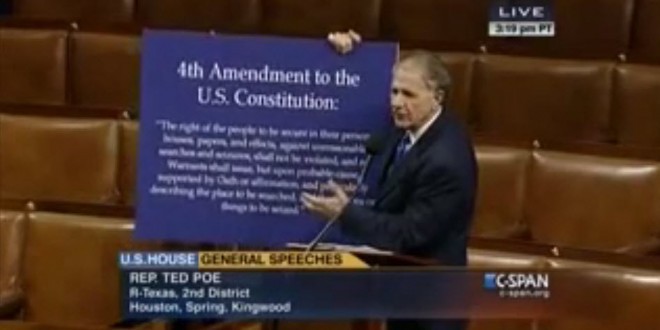Excerpts from a much longer speech that can be read here, or listened to below.
Rep POE of Texas. “This morning, somewhere in the United States, somebody woke up and sent out some emails and made a phone call. A person may have had a meeting, so he got his little iPhone out–5 or 6 or whatever it is–and pulled up Google maps to figure out a route to get from where he was to where the meeting was. He took his vehicle or maybe jumped in a cab and checked Facebook if he were in a cab, on the phone, texted his friend, and maybe even played what is now something fun, I guess, for some people–“Candy Crush”–on the iPhone.
After the meeting is over with, this individual may head off to the office, log onto the computer, do a little G-chatting with a friend about where he planned to go for dinner that evening, and later that evening, he uploads a photograph from supper, as we call it in Texas, on his Instagram. That is, maybe, a typical day for a lot of people.
But, all during that route of the American citizen’s, the Federal Government has the ability to stalk that individual every step of the way because of the devices that he is using electronically. Maybe, until last year–until some news came out by the national media–most Americans were unaware that their every move could be tracked by Big Brother. Through the NSA, which I call the “National Spy Agency” now, the government has the ability to read citizens’ emails, to read their texts, to know their phone logs, to track the location and travel and movements of citizens, to snoop and collect information about individuals through smartphones, apps, to read G-chats, and to look at private photographs–all unknown to the citizen.
The failure to disclose any of this information until recently is why many Americans now fear government intrusion–I call it government stalking–into our lives. The stalking government has kept its Peeping Tom activities a big secret until, primarily, Edward Snowden told us all about it.” ….
…. “Let me try to describe it this way. Let’s go back to Bobby Oglethorpe. Let’s say that Bobby Oglethorpe lives close to where I do in Atascocita, Texas, and the police come to me as a judge and say: Judge, we know that Bobby Oglethorpe lives in this ZIP Code here, but we don’t know where he lives, and he is no good. He is a criminal, and he is in possession of firearms and drugs, and all kinds of illegal things he has done, but we don’t know which house he is in in this particular ZIP Code, so we want to go search all the houses in the ZIP Code and hopefully we will catch him.
No judge in this country would sign a warrant and say: All right. Have at it. Start searching all the houses looking for this one guy with all this bad illegal stuff that he is in possession of.
No judge would do that. Why? Because it violates the Fourth Amendment. Why? Because it is not specific enough. It is a general warrant, like the British were imposing on the Colonies that, as John Adams said, sparked the American Revolution. Wouldn’t do that.” ….
To listen to part one, click here http://youtu.be/KpuNJH0bdrY
POE, LOFGREN & DELBENE INTRODUCE BIPARTISAN BILL TO PROTECT FOURTH AMENDMENT RIGHTS
WASHINGTON, D.C. – Lawmakers introduced bipartisan legislation today updating a decades old communications privacy law to better shield Internet users and wireless subscribers from overly broad government surveillance programs.
The Online Communications and Geolocation Protection Act, introduced by U.S. Reps. Zoe Lofgren (D-Calif.), Ted Poe (R- Texas), and Suzan DelBene (D- Wash.), modernizes the 1986 Electronic Communications Privacy Act (ECPA) by requiring government agencies to obtain a search warrant based on probable cause prior to intercepting or forcing disclosure of electronic communications or geolocation data.
The 1986 law – intended to set legal standards that law enforcement agencies must meet to access electronic communications – has failed to keep pace with rapidly evolving technology, leading to weak and convoluted privacy protections from government access to user data. As consumers and businesses increasingly use cloud computing and location-based services, the law’s standards no longer reflects the way these services are used today, nor adequately protect Americans’ right to privacy.
“Fourth Amendment protections don’t stop at the Internet, and Americans rightly expect Constitutional protections to extend to their online communications and location data,” said Lofgren. “Establishing a warrant standard for government access to cloud and geolocation provides Americans with the privacy protections they expect, and would enable service providers to build greater trust with their users and global trading partners.”
“Technology may change, but the Constitution does not. Whether an individual’s property is physical or digital, it must be protected from snooping government eyes, as required under the Fourth Amendment. It’s time for Washington to modernize this outdated legislation and protect individual privacy,” said Poe.
“Advances in technology and the Internet have dramatically changed the way we communicate, live and work. In this constantly evolving world, Congress must be a good steward of policy to ensure our laws at least keep pace,” said DelBene. “When current law affords more protections for a letter in a filing cabinet than an email on a server, it’s clear our policies are outdated. This bill will update privacy protections for consumers while resolving competing interests between innovation, international competitiveness and public safety.”
As currently written, the Electronic Communications Privacy Act does not clearly require law enforcement to obtain a warrant to access the content of Americans’ online communication – instead, ECPA permits law enforcement to access content with a mere subpoena if the content is more than 180 days old.
ECPA also fails to include any clear standards for law enforcement access to location information, such as tracking an individual’s cell phone location. The unclear and complex standards have led to confusion in U.S. courts, a significant compliance burden for businesses, a competitive disadvantage with international businesses in countries with stronger laws against government access, and inadequate privacy for Americans.
The Online Communications and Geolocation Protection Act fixes ECPA by applying Constitutional privacy guarantees under the Fourth Amendment to an individual’s digital communications and location data while minimizing the impact on law enforcement investigations. The bill will:
- Require the government to obtain a warrant to access to wire or electronic communications content;
- Require the government to obtain a warrant to intercept or force service providers to disclose geolocation data;
- Preserve exceptions for emergency situations, foreign intelligence surveillance, individual consent, public information, and emergency assistance;
- Prohibit service providers from disclosing a user’s geolocation information to the government in the absence of a warrant or exception;
- Prohibit the use of unlawfully obtained geolocation information as evidence;
- Provide for administrative discipline and a civil cause of action if geolocation information is unlawfully intercepted or disclosed.
 HKA Texas Humble, Kingwood, Atascocita, Texas Humble, Kingwood, Atascocita, Texas
HKA Texas Humble, Kingwood, Atascocita, Texas Humble, Kingwood, Atascocita, Texas




